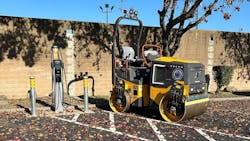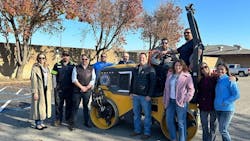California Fleet Among the First to Add Volvo Electric Compactor
California's Yolo county has become one of the first in the U.S. to put a new Volvo DD25 electric compactor to use. With a local economy that depends largely on its climate for agricultural success, the Yolo County Board of Supervisors passed a resolution in 2020 to achieve a carbon-negative footprint by 2030.
California has some of the country’s most progressive clean air regulations and incentives, which led Yolo County to establish a Climate Action and Adaptation Plan that outlines more than 180 actions aimed at reducing greenhouse gas emissions.
A critical action on the list is electrifying the county’s fleet of on- and off-road equipment. In addition to the DD25 Electric compactor, the team has six electric forklifts and two electric pickup trucks with three more in the works.
"We’re taking a bold step forward in our commitment to sustainability by adding this electric compactor to our fleet,” said Lucas Frerichs, chair of the Yolo County Board of Supervisors, in a statement. “This not only supports our carbon-negative goal, but [will] protect our environment and improve the quality of life for our residents."
Mentioned in this article
- Volvo begins production of its DD25 electric compactor in Shippensburg
- The latest in sustainability
- The latest in forklifts
- The latest pickup trucks
- The latest in equipment maintenance and repair
Yolo County’s DD25 Electric compactor will need to charge no more than a few overnights per week using an existing Level 2 AC charger at their fleet facility. The machine will typically operate for three to four hours a day, and the charge is expected to last for at least six to eight hours.
“There are some remote areas in the county, so we’re looking into a mobile, self-contained charging unit as well, so we wouldn’t have to bring the machine back to the yard each night during a long-term project,” said Lee.
One feature that helps the DD25 Electric run longer is the fact that it does not idle. By turning off automatically when not in use, the machine preserves battery life — unlike a diesel machine that continues to burn fuel as it idles.
Another perk that Lee’s team is looking forward to is simplified maintenance. Because there is no engine or fuel system, filters and diesel exhaust fluid are not necessary. The usual hydraulic oil and grease are all that’s needed.
About the Author
Harlee Hewitt
Harlee is a former associate editor for Construction Equipment.

